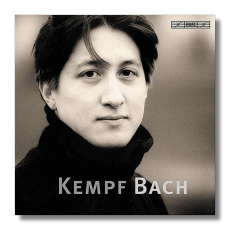
The Internet's Premier Classical Music Source
Related Links
- J.S. Bach Reviews
- Latest Reviews
- More Reviews
-
By Composer
-
Collections
DVD & Blu-ray
Books
Concert Reviews
Articles/Interviews
Software
Audio
Search Amazon
Recommended Links
Site News
 CD Review
CD Review
Johann Sebastian Bach

Works for Solo Keyboard
- Partita #4 in D Major, BWV 828 [32:10]
- Partita #6 in E minor, BWV 830 [33:50]
Freddy Kempf, piano
Recorded Nybrokajen 11, Stockholm, July 2002 Released March 2006
BIS CD-1330 66:03
Comparisons: Gould/Sony, Kuschnerova/Orfeo, Rangell/Dorian, Rubsam/Naxos, Schepkin/Ongaku, Tureck/Philips
Freddy Kempf is a fast-rising young star of the piano literature known for his outstanding virtuosity and independence. Any complaints about Kempf's music-making concern the issues of mannerisms and characterization.
Unfortunately, these complaints rear their heads in Kempf's new Bach recording of two of the six keyboard partitas.
First, the good stuff. Kempf has 'flying fingers' and an overall technique that is very impressive; just listen to his dynamic accounts of the Gigues from each Partita. Also, his ornamentation is just how I like it: tasteful, judiciously employed, and always a natural enhancement to the music arguments. Kempf's double-dotted rhythmic figures, such as in the D Major Partita's Overture, are highly ceremonial with plenty of rhythmic lift. In the Sarabandes, Kempf is attractively poignant, a quality that also informs his unusually slow-paced Allemande in the E minor Partita where he makes Rosalyn Tureck sound like a speed demon in her measured performance.
The debit side is also substantial. I mentioned earlier Kempf's excellent rhythmic lift in the double-dotted Overture. Well, that's the only time that the interpretations involve a significant bounce as Kempf tends to flatten Bach's rhythms; its strongest manifestation is in the D Major's Air where the rhythmic patterns are squashed with the added disadvantage of weeping descending lines that are quite feeble and entirely uninvolved.
Another concern is that Kempf displays a penchant for playing in a demure and rather precious manner that is most damaging in the D Major's magnificent and regal Allemande where the pianist trades in majesty for flimsy meanderings. Other less than sterling qualities include some spongy articulation, weak conversation among voices and reduced bite to the phrasing.
Perhaps most problematic is a lack of character to Kempf's interpretations.
Each of the comparison versions possesses abundant character, and I don't consider it unreasonable to expect a healthy amount from Kempf. But he doesn't strongly portray any of Bach's most compelling musical traits: severity, joy, rhetoric/conversation, spirituality, foreboding, remorse, playfulness, the "Papa Bach" effect, or any other quality you would personally include. Kempf can't hold a candle to Gould's majesty and precision, Tureck's probing nature, Rubsam's unique creativity, Schepkin's poetry, or Kuschnerova's joyful declarations.
Kempf's soundstage is fine, neither enhancing nor diminishing the impact of his performances. But the program is not market-friendly with only two Partitas on the disc. Most modern-era recordings have three Bach keyboard partitas, but Kempf has picked the two longest of the six, insuring no space for another.
Don's Conclusions: Kempf's new Bach recording adds little to the discography of the keyboard partitas. Character is lacking, and there are many alternative discs that are rich in personality. My best advice is to acquire the Gould, Tureck, and Rubsam piano sets; each is highly individualized and stunning in its impact.
Copyright © 2006, Don Satz




















